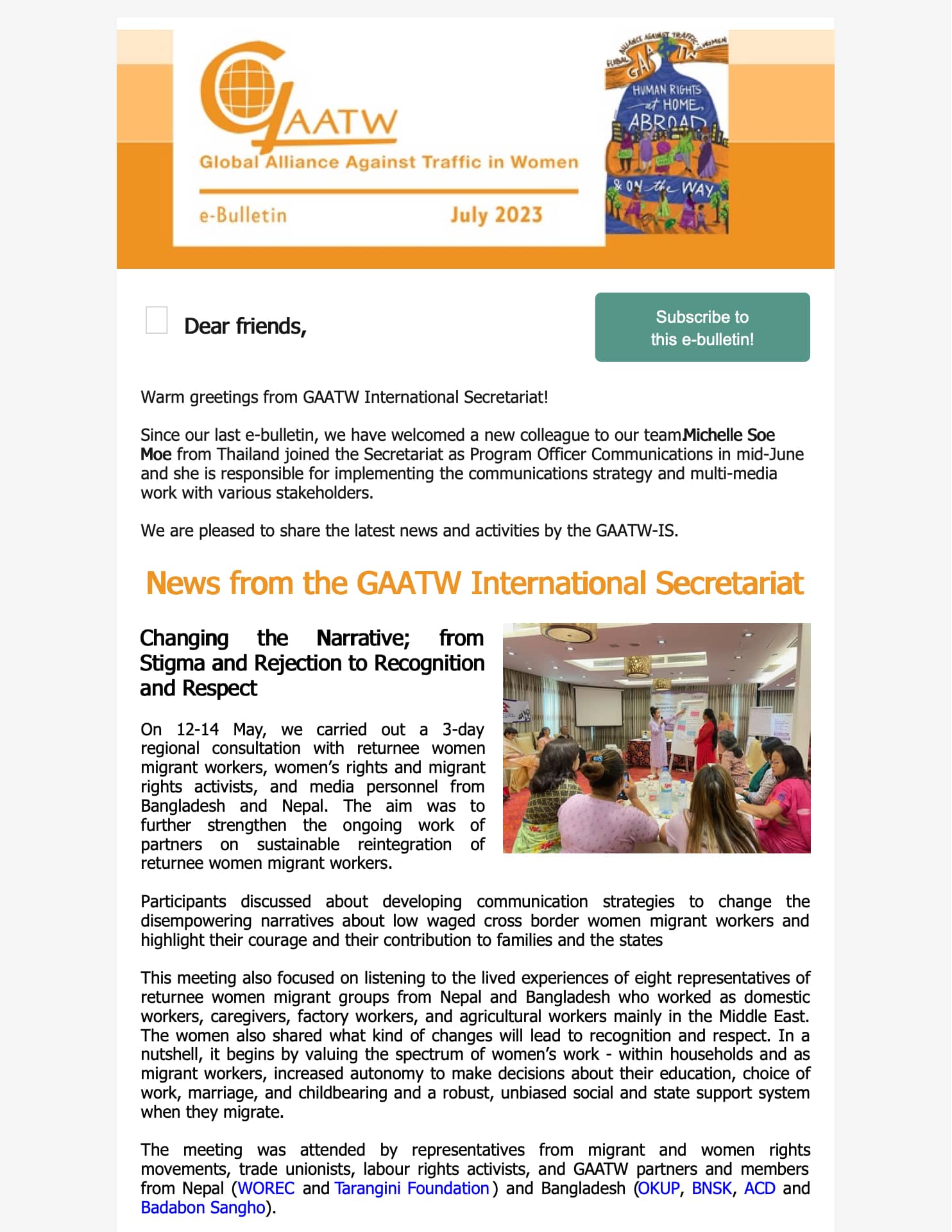
GAATW E-bulletin: Issue 3, July 2023
Dear friends,
Warm greetings from GAATW International Secretariat!
Since our last e-bulletin, we have welcomed a new colleague to our team. Michelle Soe Moe from Thailand joined the Secretariat as Program Officer Communications in mid-June and she is responsible for implementing the communications strategy and multi-media work with various stakeholders.
We are pleased to share the latest news and activities by the GAATW-IS.
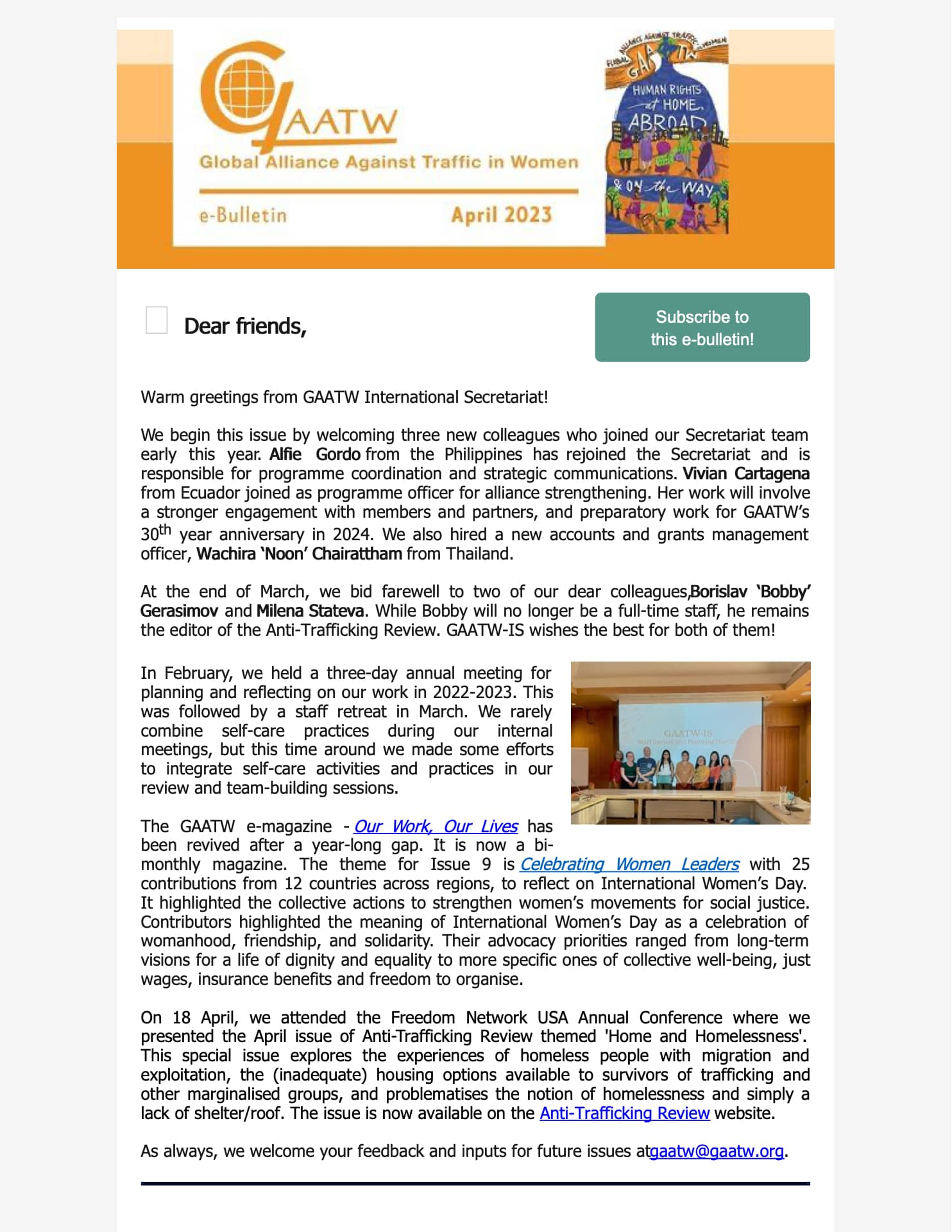
GAATW E-bulletin: Issue 2, April 2023
Dear friends,
Warm greetings from GAATW International Secretariat!
We begin this issue by welcoming three new colleagues who joined our Secretariat team early this year. Alfie Gordo from the Philippines has rejoined the Secretariat and is responsible for programme coordination and strategic communications. Vivian Cartagena from Ecuador joined as programme officer for alliance strengthening. Her work will involve a stronger engagement with members and partners, and preparatory work for GAATW’s 30th year anniversary in 2024. We also hired a new accounts and grants management officer, Wachira ‘Noon’ Chairattham Wachira ‘Noon’ Chairattham from Thailand.
At the end of March, we bid farewell to two of our dear colleagues, Borislav ‘Bobby’ Gerasimov and Milena Stateva. While Bobby will no longer be a full-time staff, he remains the editor of the Anti-Trafficking Review. GAATW-IS wishes the best for both of them!
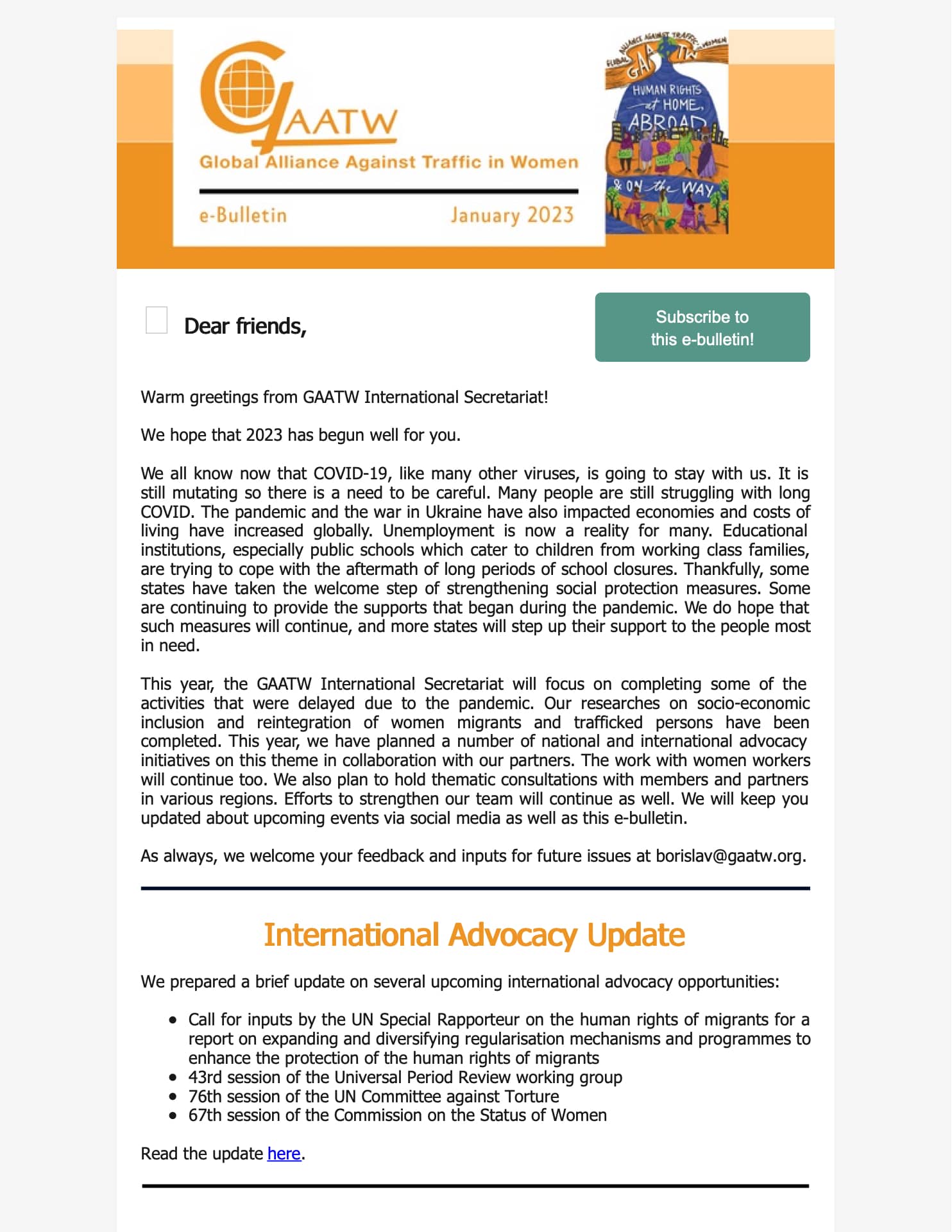
GAATW E-bulletin: Issue 1, January 2023
Dear friends,
Warm greetings from GAATW International Secretariat!
We hope that 2023 has begun well for you.
We all know now that COVID-19, like many other viruses, is going to stay with us. It is still mutating so there is a need to be careful. Many people are still struggling with long COVID. The pandemic and the war in Ukraine have also impacted economies and costs of living have increased globally. Unemployment is now a reality for many. Educational institutions, especially public schools which cater to children from working class families, are trying to cope with the aftermath of long periods of school closures. Thankfully, some states have taken the welcome step of strengthening social protection measures. Some are continuing to provide the supports that began during the pandemic. We do hope that such measures will continue, and more states will step up their support to the people most in need.
This year, the GAATW International Secretariat will focus on completing some of the activities that were delayed due to the pandemic. Our researches on socio-economic inclusion and reintegration of women migrants and trafficked persons have been completed.
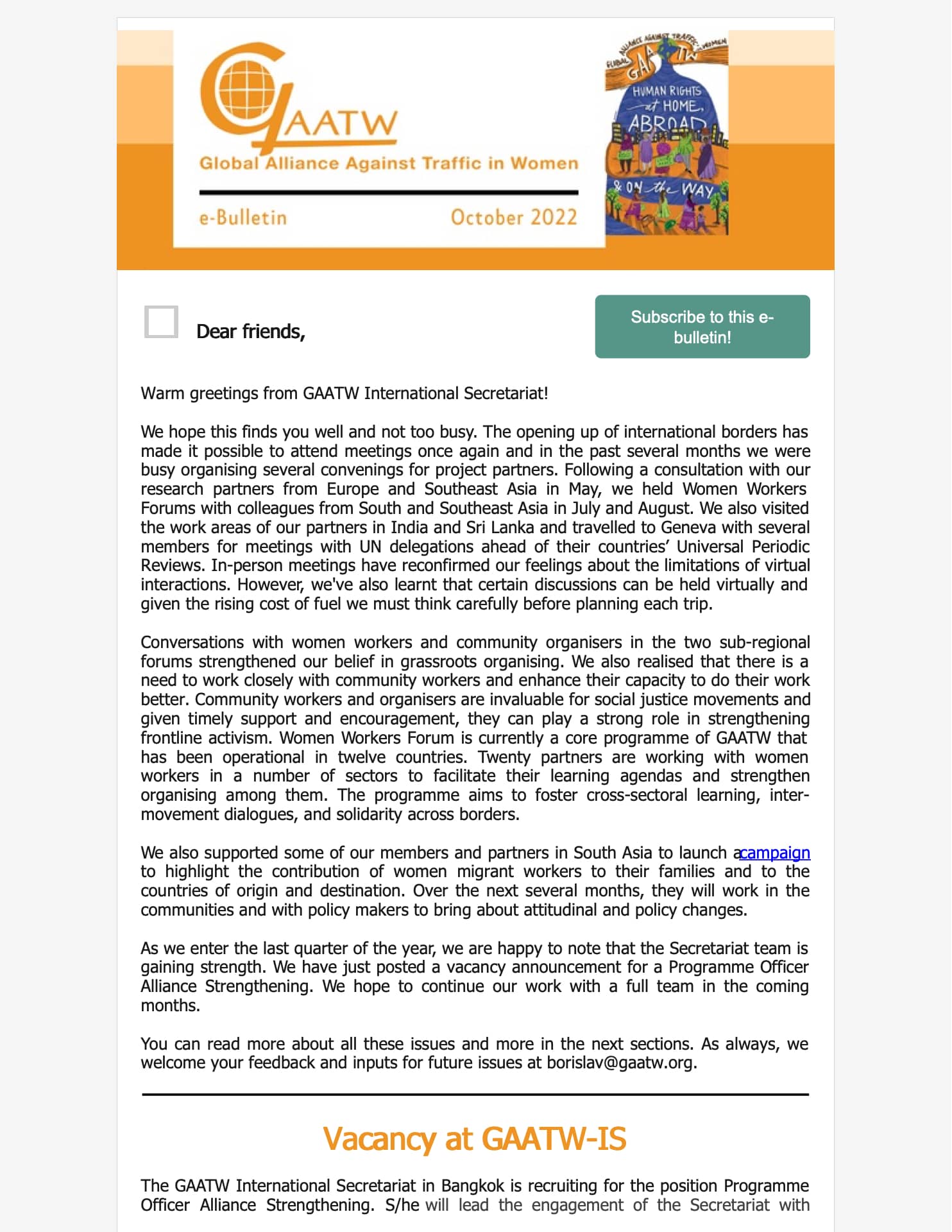
GAATW E-bulletin: Issue 3, October 2022
Dear friends,
Warm greetings from GAATW International Secretariat!
We hope this finds you well and not too busy. The opening up of international borders has made it possible to attend meetings once again and in the past several months we were busy organising several convenings for project partners. Following a consultation with our research partners from Europe and Southeast Asia in May, we held Women Workers Forums with colleagues from South and Southeast Asia in July and August. We also visited the work areas of our partners in India and Sri Lanka and travelled to Geneva with several members for meetings with UN delegations ahead of their countries’ Universal Periodic Reviews. In-person meetings have reconfirmed our feelings about the limitations of virtual interactions. However, we've also learnt that certain discussions can be held virtually and given the rising cost of fuel we must think carefully before planning each trip.
Conversations with women workers and community organisers in the two sub-regional forums strengthened our belief in grassroots organising. We also realised that there is a need to work closely with community workers and enhance their capacity to do their work better.
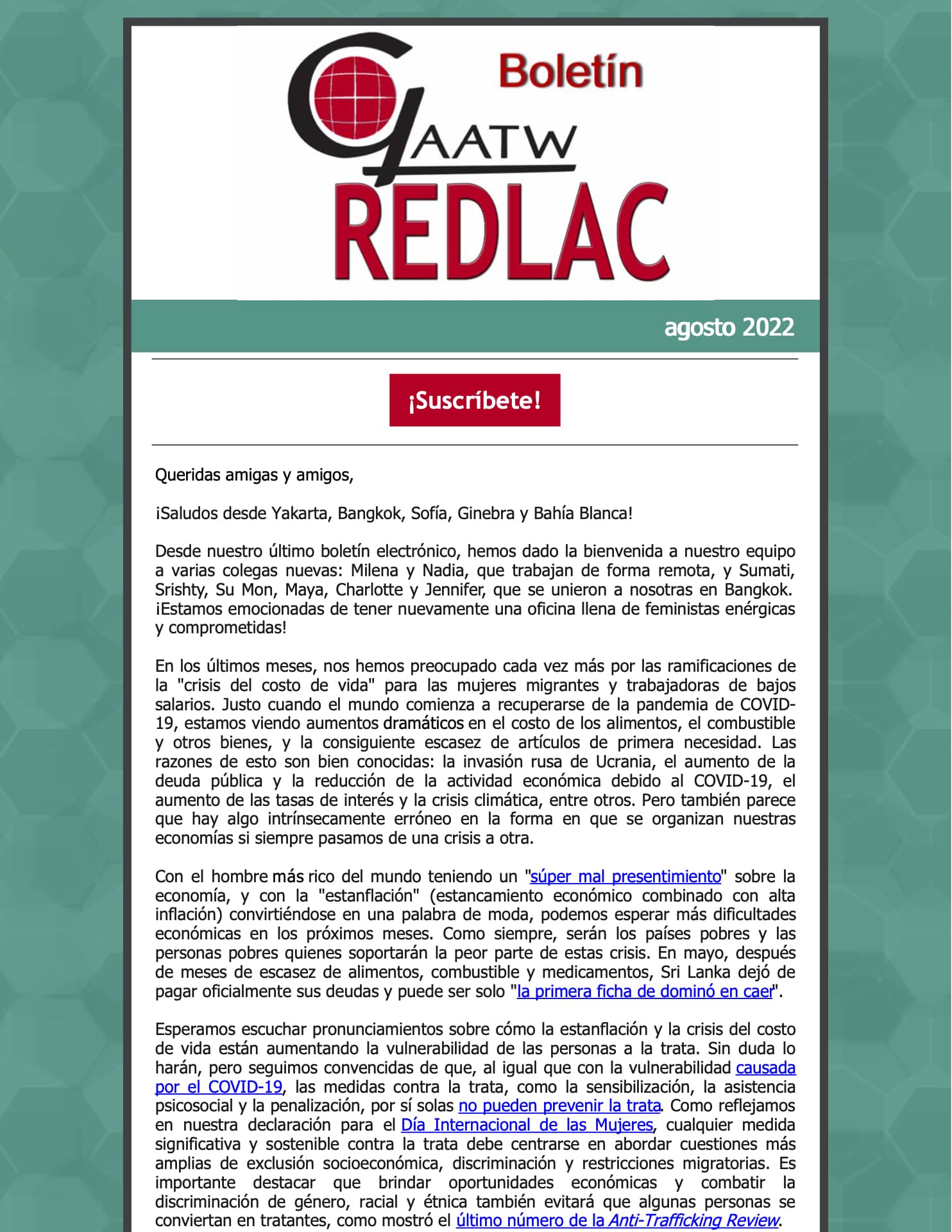
Boletín en español, Agosto 2022
Queridas amigas y amigos,
¡Saludos desde Yakarta, Bangkok, Sofía, Ginebra y Bahía Blanca!
Desde nuestro último boletín electrónico, hemos dado la bienvenida a nuestro equipo a varias colegas nuevas: Milena y Nadia, que trabajan de forma remota, y Sumati, Srishty, Su Mon, Maya, Charlotte y Jennifer, que se unieron a nosotras en Bangkok. ¡Estamos emocionadas de tener nuevamente una oficina llena de feministas enérgicas y comprometidas!
En los últimos meses, nos hemos preocupado cada vez más por las ramificaciones de la "crisis del costo de vida" para las mujeres migrantes y trabajadoras de bajos salarios. Justo cuando el mundo comienza a recuperarse de la pandemia de COVID- 19, estamos viendo aumentos dramáticos en el costo de los alimentos, el combustible y otros bienes, y la consiguiente escasez de artículos de primera necesidad. Las razones de esto son bien conocidas: la invasión rusa de Ucrania, el aumento de la deuda pública y la reducción de la actividad económica debido al COVID-19, el aumento de las tasas de interés y la crisis climática, entre otros. Pero también parece que hay algo intrínsecamente erróneo en la forma en que se organizan nuestras economías si siempre pasamos de una crisis a otra.
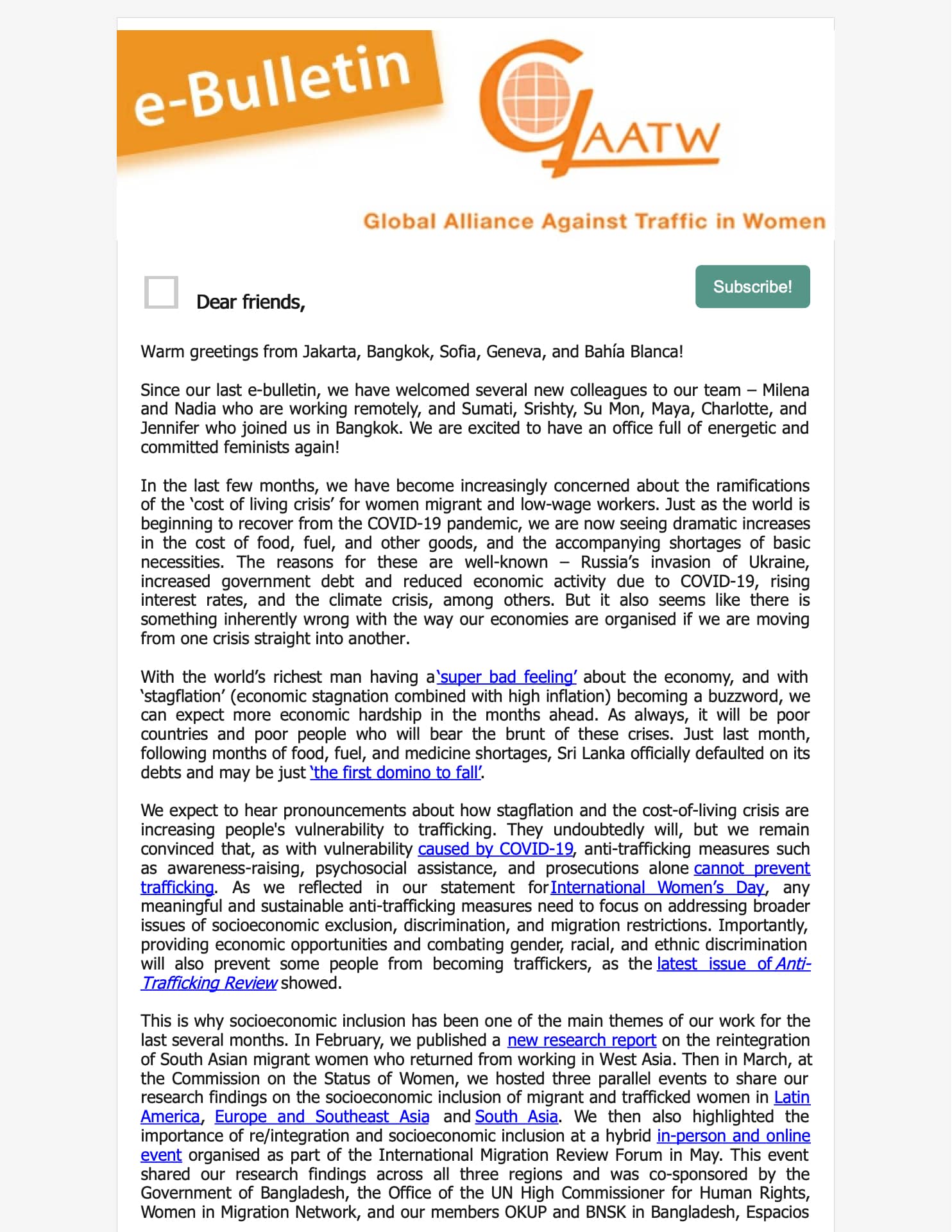
GAATW E-bulletin: Issue 2, June 2022
Dear friends,
Warm greetings from Jakarta, Bangkok, Sofia, Geneva, and Bahía Blanca!
Since our last e-bulletin, we have welcomed several new colleagues to our team – Milena and Nadia who are working remotely, and Sumati, Srishty, Su Mon, Maya, Charlotte, and Jennifer who joined us in Bangkok. We are excited to have an office full of energetic and committed feminists again!
In the last few months, we have become increasingly concerned about the ramifications of the ‘cost of living crisis’ for women migrant and low-wage workers. Just as the world is beginning to recover from the COVID-19 pandemic, we are now seeing dramatic increases in the cost of food, fuel, and other goods, and the accompanying shortages of basic necessities. The reasons for these are well-known – Russia’s invasion of Ukraine, increased government debt and reduced economic activity due to COVID-19, rising interest rates, and the climate crisis, among others. But it also seems like there is something inherently wrong with the way our economies are organised if we are moving from one crisis straight into another.
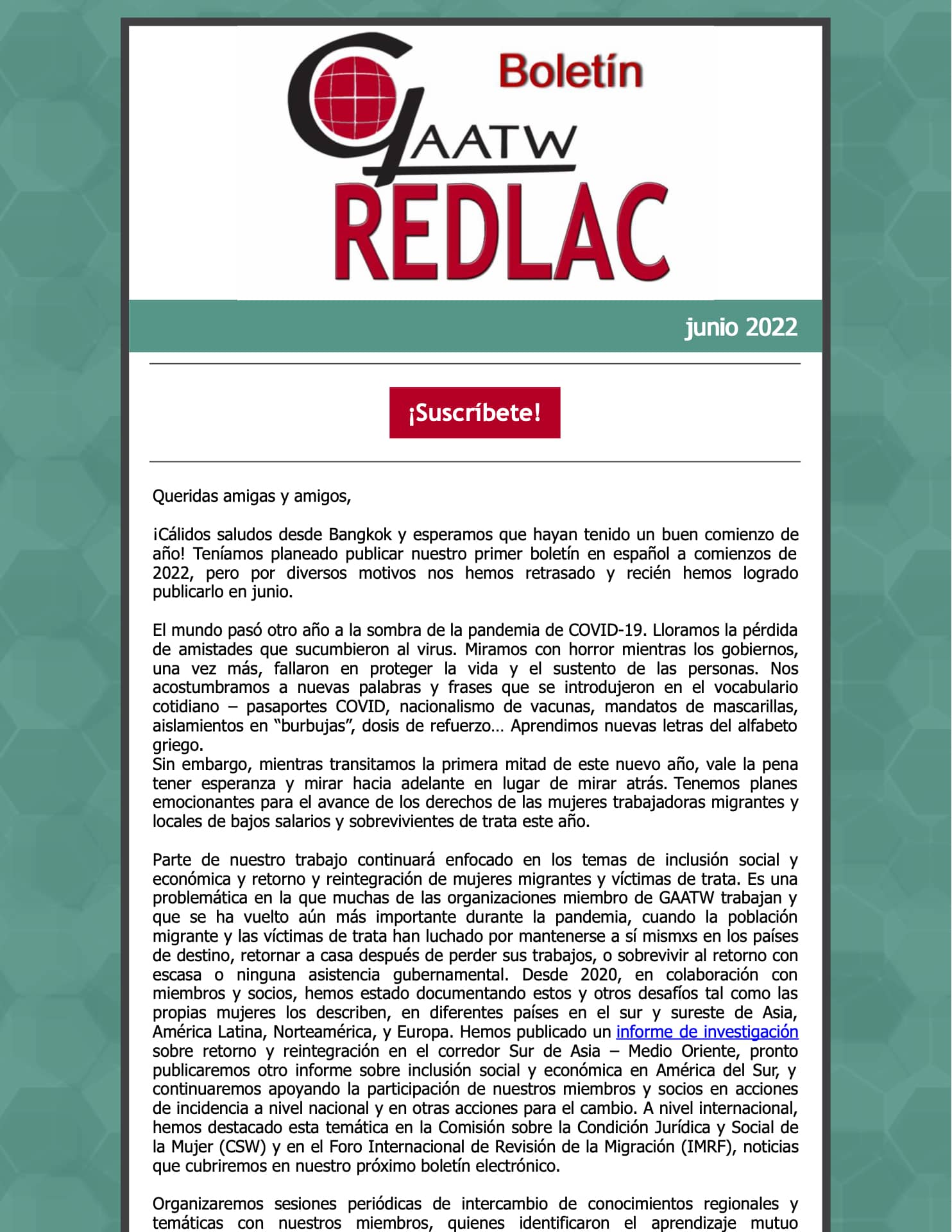
Boletín en español, Junio 2022
Queridas amigas y amigos,
¡Cálidos saludos desde Bangkok y esperamos que hayan tenido un buen comienzo de año! Teníamos planeado publicar nuestro primer boletín en español a comienzos de 2022, pero por diversos motivos nos hemos retrasado y recién hemos logrado publicarlo en junio.
El mundo pasó otro año a la sombra de la pandemia de COVID-19. Lloramos la pérdida de amistades que sucumbieron al virus. Miramos con horror mientras los gobiernos, una vez más, fallaron en proteger la vida y el sustento de las personas. Nos acostumbramos a nuevas palabras y frases que se introdujeron en el vocabulario cotidiano – pasaportes COVID, nacionalismo de vacunas, mandatos de mascarillas, aislamientos en “burbujas” , dosis de refuerzo… Aprendimos nuevas letras del alfabeto griego.
Sin embargo, mientras transitamos la primera mitad de este nuevo año, vale la pena tener esperanza y mirar hacia adelante en lugar de mirar atrás. Tenemos planes emocionantes para el avance de los derechos de las mujeres trabajadoras migrantes y locales de bajos salarios y sobrevivientes de trata este año.
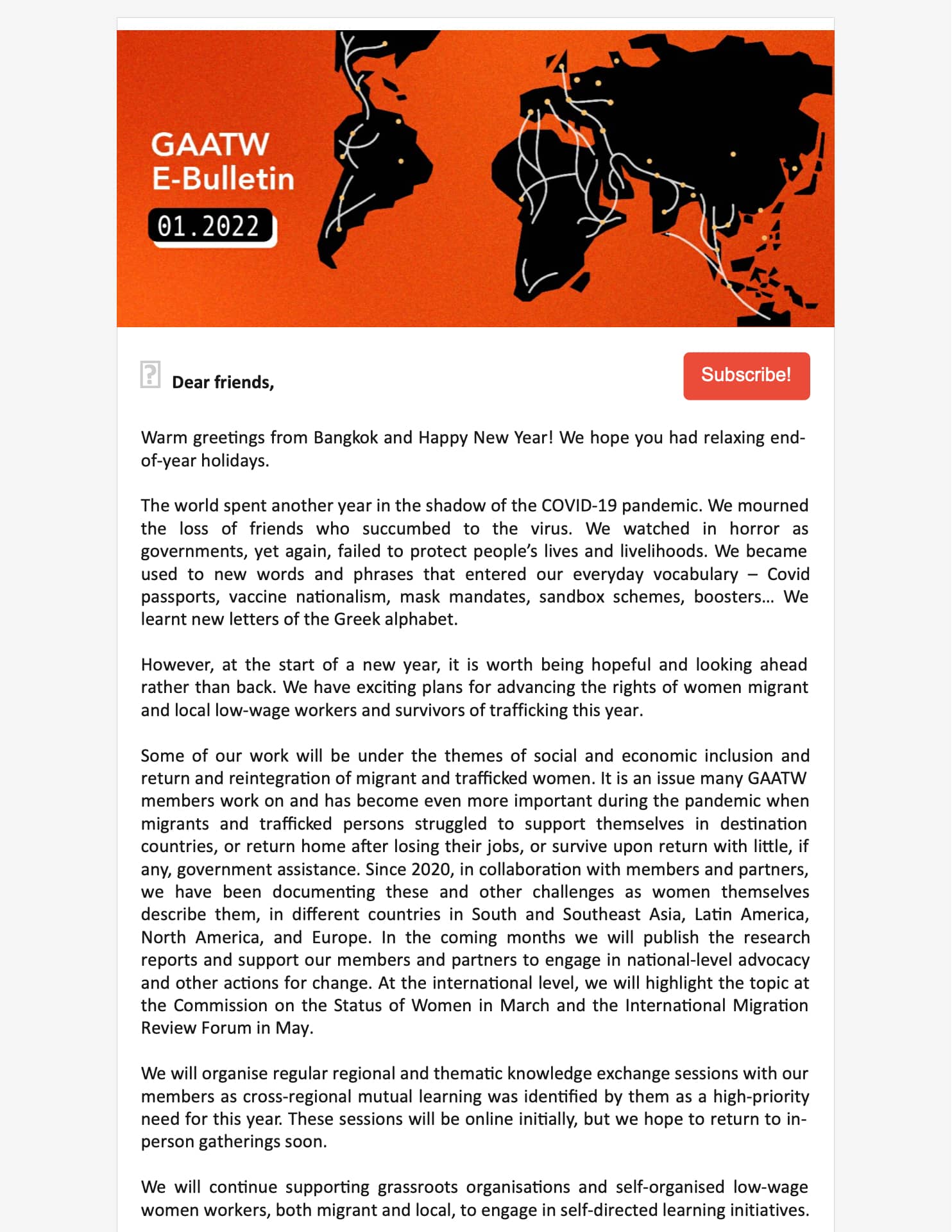
GAATW E-bulletin: Issue 1, January 2022
Dear friends,
Warm gree ngs from Bangkok and Happy New Year! We hope you had relaxing end- of-year holidays.
The world spent another year in the shadow of the COVID-19 pandemic. We mourned the loss of friends who succumbed to the virus. We watched in horror as governments, yet again, failed to protect people’s lives and livelihoods. We became used to new words and phrases that entered our everyday vocabulary – Covid passports, vaccine na onalism, mask mandates, sandbox schemes, boosters… We learnt new letters of the Greek alphabet.
However, at the start of a new year, it is worth being hopeful and looking ahead rather than back. We have exci ng plans for advancing the rights of women migrant and local low-wage workers and survivors of trafficking this year.
